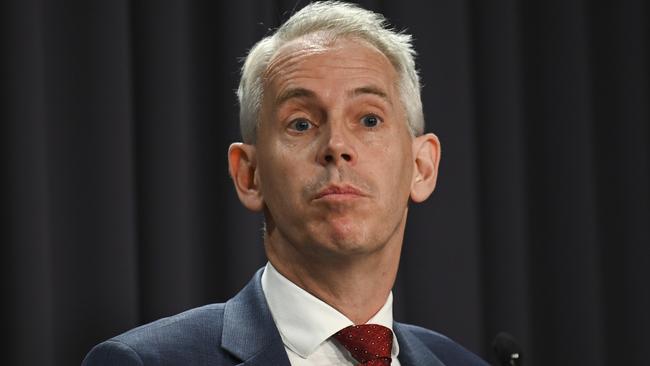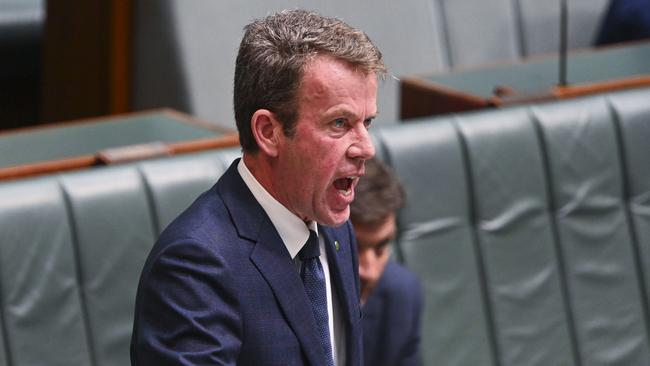Citizenship test blame game as fail rates surge
The number of aspiring Australians passing citizenship tests has plunged, with the Coalition accusing Labor of neglecting to ‘teach new citizens what it means to be Australian’ | TAKE THE TEST

The number of aspiring Australians passing citizenship tests has plunged under the Albanese government, with the Coalition accusing Labor of neglecting to “teach new citizens what it means to be Australian”.
Amid a surge in post-pandemic migration and pressure on the federal government to manage immigration levels, new Department of Home Affairs data reveals more than 100,000 failed citizenship tests over a 14-month period between June 2022 and August 2023.
The tests, which include 20 multiple choice questions on freedom of speech, the importance of democracy and rule of law, require a person to correctly answer five questions on Australian values and achieve a mark of at least 75 per cent to pass.
Government data shows the pass rate under Labor has fallen to 65 per cent compared to about 80 per cent under the Coalition between 2017 and 2021. Since the May 2022 election, 288,603 citizenship tests were administered to August 31 last year, with 187,574 tests passed.
The citizenship test was last updated by the Morrison government in November 2020 to include a “dedicated section on Australian values”.
A practice test on the Department of Home Affairs website includes basic questions including what Australia commemorates on Anzac Day, the colours of the Aboriginal flag, the commonwealth coat of arms and the capital city of Australia.
It also includes questions about what happened on January 1, 1901, examples of equality and freedom of speech in Australia, what is a referendum, which arm of government has the power to interpret and apply laws, the role of the governor-general and whether people should make an effort to learn English.
The Australian understands the downwards test pass rate trend is linked with the 2020 changes and introduction of an automatic fail if applicants cannot answer the values questions. The Albanese government has made only one change to the citizenship test, reflecting the death of Queen Elizabeth II.
Under the Coalition, 684,208 tests were administered between 2017 and 2021, with 542,648 passed at a rate of almost 80 per cent. However, pass rates fell from 87 per cent in 2019 to 68 per cent in 2021 following the Coalition’s test changes.
Immigration Minister Andrew Giles said the government was “committed to a citizenship system that is fair, efficient and inclusive”.
“The Albanese government recognises that Australia is a country built on citizenship. We … will continue to assess the citizenship test to ensure that it meets community expectations,” Mr Giles told The Australian.
The number of citizenship tests administered in 2022 was not associated with post-Covid migration because eligible applicants must meet residence requirements. Those who took tests in the past two years have lived in Australia from at least 2019. A higher number of tests is expected to be administered this year as a result of the Albanese government’s new pathways for New Zealand citizens to become Australian citizens.

Current rules state that while failing the test does not affect a person’s permanent visa or stop them from living in Australia, “if you do not pass the test after three appointments, we may refuse your application”.
Mr Giles accused Opposition Leader Peter Dutton of making a “mess of the entire migration system – including citizenship”, with wait times ballooning to “more than two years while over 200,000 people were left waiting in a queue”. Since the 2022 election, citizenship processing times have been slashed by around 40 per cent with the government claiming the lowest backlog in six years.
Citizenship law changes put forward by Mr Dutton and Malcolm Turnbull in 2017 to lift the permanent residency requirement from at least one year to four years and impose tougher English language requirements were scuttled by Labor and the Greens. Other plans, including banning people taking the test for two years if they failed three times, were also shelved.
Opposition immigration and citizenship spokesman Dan Tehan said the government wasn’t doing enough to educate aspiring citizens about Australian values and history.
“The Albanese government has been so busy rubberstamping visas they have neglected to teach new citizens what it means to be Australian,” Mr Tehan said.
“Labor are not investing in Australian values and Australian citizenship and this is the result, councils rejecting citizenship ceremonies on Australia Day and falling pass rates for the citizenship test.
“The Prime Minister needs to show leadership. If he supports Australia Day, he should come out and be proud to say it.”
Mr Tehan last month attacked the government for allowing up to 81 councils to cancel citizenship ceremonies on Australia Day and pledged the Coalition would force local government to hold citizenship ceremonies on January 26.
The migration strategy released last month outlined Labor’s plan to streamline permanent residence and citizenship pathways for temporary migrants. Excluding visitors and transit visas, temporary migrants have grown from 700,000 in 2000 to 2.2 million in 2023.








To join the conversation, please log in. Don't have an account? Register
Join the conversation, you are commenting as Logout